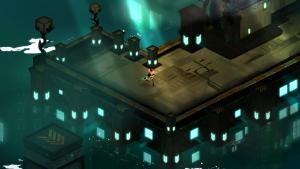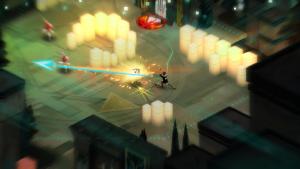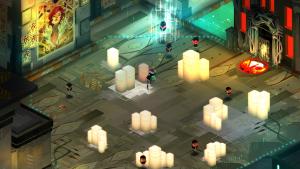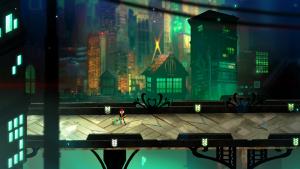Supergiant Games: Transistor Interview
 June 15, 2013 – I had the opportunity to speak with Creative Director Greg Kasavin and Studio Director Amir Rao about Transistor, Supergiant Games' newest project currently in development. From personal perspectives on the project and Bastion's history to technical information, Kasavin and Rao spoke candidly. One thing was clear throughout: they are excited about Transistor.
June 15, 2013 – I had the opportunity to speak with Creative Director Greg Kasavin and Studio Director Amir Rao about Transistor, Supergiant Games' newest project currently in development. From personal perspectives on the project and Bastion's history to technical information, Kasavin and Rao spoke candidly. One thing was clear throughout: they are excited about Transistor.
When asked about the challenges Bastion presented, Kasavin noted that the game's success and the public's overwhelming positive response provided little to improve upon; instead, he noted that Supergiant Games is trying to create something entirely new, and that Transistor has no relation to Bastion. Rao mentioned that easter eggs and references may occur, but he was hush-hush about anything specific. Kasavin mentioned that one big difference between Bastion's development and Transistor's is in the length of time spent on the game. Specifically, he mentioned that instead of pulling twenty-hour days, the team enjoys more "normal" work hours, which means that Transistor may take longer to finish than Bastion. Sporting ten people on its team, Supergiant Games has been afforded the opportunity to take its time, thanks in part to Bastion's success.
 Regarding the greatest excitement of working on Transistor, Kasavin noted that the team simply enjoys making deep and interesting worlds wherein players "give a damn." The team enjoys its games' unique identities and wants to explore the limits of their potential. When asked if he felt pressured to produce a game at the level of Bastion's success, Kasavin noted that the real pressure comes from being surrounded by so many talented people on a daily basis and wanting to contribute as effectively as his colleagues. He also remarked that debate and disagreement within the company aids in the creative process, ultimately providing a better product. Fortunately, events such as E3 present the opportunity for validation from the public, letting Supergiant Games know that they're moving in the right direction.
Regarding the greatest excitement of working on Transistor, Kasavin noted that the team simply enjoys making deep and interesting worlds wherein players "give a damn." The team enjoys its games' unique identities and wants to explore the limits of their potential. When asked if he felt pressured to produce a game at the level of Bastion's success, Kasavin noted that the real pressure comes from being surrounded by so many talented people on a daily basis and wanting to contribute as effectively as his colleagues. He also remarked that debate and disagreement within the company aids in the creative process, ultimately providing a better product. Fortunately, events such as E3 present the opportunity for validation from the public, letting Supergiant Games know that they're moving in the right direction.
 In terms of qualities specific to Transistor, Kasavin noted that "The Process" is a sort of force that seeks out the Transistor, a blade that the protagonist, Red, discovers at the onset. While exploring, players encounter columns jutting from the floor and monsters; Kasavin states that this is The Process. The sentient blade, Transistor, is aware of The Process, and responds in the present, differing significantly from the omniscient narration of Rucks in Bastion. I asked Kasavin if the types of powers gained from the dead bodies Red encounters had anything to do with the deceased's former lives or personalities, to which he was bemused, noting that that may be a motivation behind the types of powers gained.
In terms of qualities specific to Transistor, Kasavin noted that "The Process" is a sort of force that seeks out the Transistor, a blade that the protagonist, Red, discovers at the onset. While exploring, players encounter columns jutting from the floor and monsters; Kasavin states that this is The Process. The sentient blade, Transistor, is aware of The Process, and responds in the present, differing significantly from the omniscient narration of Rucks in Bastion. I asked Kasavin if the types of powers gained from the dead bodies Red encounters had anything to do with the deceased's former lives or personalities, to which he was bemused, noting that that may be a motivation behind the types of powers gained.
Those who've researched the enemies in Transistor know that Jerks make an appearance, enemies similar in design to Scumbags from Bastion. When asked about the name choice, Rao mentioned that Supergiant Games wants playful names to go along with the enemies and what they do. After all, the enemies, "Get in your face, so they're jerks." Stylistically, I found Transistor somewhat "noir," and when I told this to Rao, he said that the team finds this comparison challenging to respond to, since their games are unique visually, musically, and in their storytelling.
 In its demo, Transistor offers gameplay similar to Bastion's, allowing players to traverse the map in real-time to fight enemies or pause the game to plan a path and actions in a fashion similar to Fallout. When asked if players can expect other major gameplay mechanics later in the game, Rao suggested that this is more than likely, but would not comment on the specifics. Most of all, players will enjoy the surprises Supergiant Games has in store and the ever-changing, challenging world they encounter.
In its demo, Transistor offers gameplay similar to Bastion's, allowing players to traverse the map in real-time to fight enemies or pause the game to plan a path and actions in a fashion similar to Fallout. When asked if players can expect other major gameplay mechanics later in the game, Rao suggested that this is more than likely, but would not comment on the specifics. Most of all, players will enjoy the surprises Supergiant Games has in store and the ever-changing, challenging world they encounter.
Currently, Transistor is still in the middle of development with a broad release window of 2014. Rao made sure to mention that the demo may not be an indication of what the final product will look like, and that changes are always taking place; to the team, this is one of the luxuries of game design and a supportive community that allows them to craft something in their unique style. But when an independent developer contributes such refreshing innovation and depth of gameplay to a market saturated with sequels and regurgitated ideas, supporting Supergiant Games comes naturally.